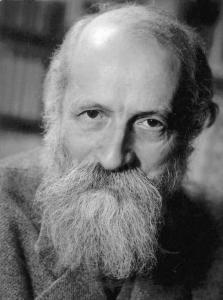I’m grateful to be part of the Patheos family of bloggers, and I’d like to introduce myself by talking a little bit about why I decided to call this blog Human Encounter.
On the surface it’s kind of an odd name—sounds like a fetish dating site for extraterrestrials. But I chose it on purpose, and for mostly theological reasons.
Encountering Encounter
Let’s start with the noun.
“Encounter” is a powerful word in my own Catholic tradition. Pope Francis has been talking in recent years about the centrality of encounter to our lives of faith, and—before that—five major events in recent Latino Catholic history were called the Encuentros.

But it’s a Jewish theologian, Martin Buber, whose name comes to mind when I think about encounter. Paul Mendes-Flohr wrote an excellent piece on Buber’s dialectic theology, for the Australian Broadcasting Corporation’s Religion and Ethics Newsweekly, that gets to the heart of why the word encounter is so important to me in the context of chaplaincy. Summarizing Buber’s philosophy, Mendes-Flohr writes in part:
“To meet the Thou of the other, one must be present to the other and also allow the other to meet one as a Thou. Thus the encounter is dialogical and enjoys an existential mutuality … But it is only by crossing ‘the narrow ridge’ of dialogue that humans may overcome their mutual isolation and break through the protective shell hiding their authentic selves.”
For me, this is what chaplaincy is. Chaplains can (and do) argue all the time about what the specifics of the field are, but it’s mainly a ministry of presence. Whatever context we work in and whatever approach we use, the first thing we do is show up with our full, attentive selves.
Only Human
Now let’s talk about the adjective.
Almost anybody can become a chaplain. I was very careful to call myself a “chaplain resident” in most contexts where I operate, because I’m not board-certified yet, but then I learned that (a) very few chaplains here in Mississippi are board-certified, and (b) some communities, like the mostly unhoused folks I serve, need actual designated chaplains.
This is not going to be a space where I try to proselytize. Some chaplains work more like missionaries than others, but most mainstream chaplaincy organizations follow the same basic principles as Brandeis University’s Chaplaincy Innovation Lab: collaborative, inclusive, respectful, and evidence-based. Some of us do missionary work too, but that’s separate from what we do as chaplains.
As you’ll learn over the course of this blog, there are also a lot of professions and activities that routinely involve spiritual care work, sometimes very competent spiritual care work, but aren’t called chaplaincy. A lot of bartenders are de facto chaplains. A lot of pastors and psychologists are de facto chaplains. Family elders often play the role of family chaplain. All of us who have the skill set to provide a ministry of presence are doing chaplaincy in everything but name.
It’s good to meet y’all. I’m grateful to have this platform to talk to you and—hopefully—to do a little listening, too.












